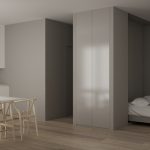Maximizing limited square footage makes multi-purpose furniture a go-to for small apartments, home offices, and spare guest bedrooms. These pieces take the guesswork out of finding an extra space to sleep the occasional overnight guest while still keeping the floor plan functional for daily use.
Two-in-one sleepers like a Murphy bed or a futon come in various shapes, sizes, and styles. Both offer fold-out beds but suit different needs depending on your lifestyle and living situation.
If you’re wondering how futons stack up against Murphy beds, this guide to space-saving sleeper furniture will help you find the best fit for your home.
What Is a Murphy Bed?
The fold-down Murphy bed, or wall bed, is popular today for the same reason that inspired its invention more than 100 years ago. William Lawrence Murphy came up with the idea for the fold-out bed around 1900 in San Francisco. Murphy placed a full-size mattress on a metal frame that could be folded up when not in use. The wall bed allowed Murphy to stow his bed in his closet.
What Is a Futon?
A futon is another common small-space sleeper. Futons are essentially a sofa that doubles as a guest bed. They’re often associated with college dorms because most options are cheap and equipped with waif-thin mattresses. Considering its origins, that association makes perfect sense.
The futon originated in Japan as a thin mattress meant to be placed directly on the floor or floor mat. The mattress could be rolled up when not in use, as explained by the design website Living Spaces. The goal was — and still is — to save space.
Murphy beds and futons are solid choices when space is at a premium. To know which one is the best fit for your space, consider how you’re planning to use the room.
A Murphy bed is the best option for rooms that genuinely need to pull double duty because Murphy beds tuck into a cabinet that folds up against the wall. This takes up much less square footage than a futon, which is as wide and deep as a small couch.
Murphy beds give you more room to move. They allow any underused bedroom to double as a home gym, office, playroom, art studio, or anything else you can dream up. Because futons take up more floor space and are designed to double as seating, the pool of possibilities gets smaller. Futons are typically best suited for living rooms, dens, and areas where sleeping and sitting must be done in the same space.
When in the upright position, some Murphy bed cabinets also have shelves for storage, which frees up additional space.
Either a Murphy bed or a futon can turn a room into a multi-purpose space. That solves a problem from a practical standpoint, but furniture — particularly the kind you sleep on — needs to be more than functional. It needs to be comfortable.
This is where wallbeds have a distinct advantage. You don’t have a big say in the type of mattress you’re getting when you purchase a futon. Unlike Murphy beds, the mattress is built into a futon’s sofa-like frame. This means you can’t easily swap the mattress out if you find it uncomfortable.
Murphy beds provide greater versatility in mattress selection because mattresses are sold separately from the frame. That doesn’t mean you have to go out and buy a special mattress if you choose a Murphy bed.
Any mattress that fits a traditional bed can be used in a Murphy bed. The mattress you’re using now would likely fit perfectly. Each Murphy bed cabinet can accommodate a specific maximum thickness, which is listed in a product description.
Murphy bed cabinets are designed for pillows and blankets remain in place when folded up, which saves you the trouble of having to make the bed each time it’s in use. It’s simply a matter of lowering the platform for a wall bed to be ready. Another common complaint is that futons tend to jam unexpectedly, making the unit near impossible to use when an overnight guest pops in.
In the short-term, putting a futon in your living room is much simpler than installing a wall bed. It can take several hours to assemble and mount a wall bed while futons generally come pre-assembled. However, Murphy beds are far more versatile and easier to use in the long run.





